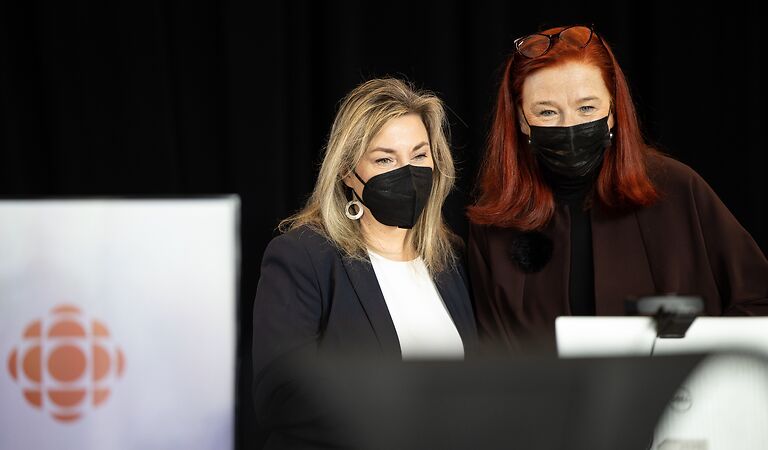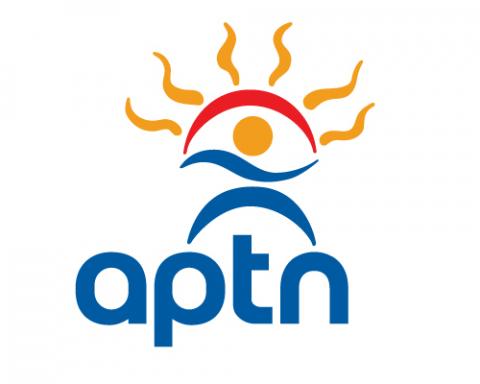
Left to right: Monika Ille, CEO of APTN and Catherine Tait, President and CEO of CBC/Radio-Canada, sign the first ever Memorandum of Understanding between both networks.
Leading media networks, APTN and CBC/Radio-Canada, have announced their partnership to help further the voices, stories and content of Indigenous Peoples.
Fronting the organizations are APTN’s Monika Ille and CBC/Radio-Canada’s Catherine Tait, who will work together to ensure the production of this content to be majority-owned by Indigenous persons while putting Indigenous Peoples in key creative positions throughout the process.
Monika Ille, member of the Abenaki First Nation of Odanak, began her journey with APTN in 2003, as the Quebec liaison officer. Before long, she was promoted to executive director of programming and scheduling, and now, she is CEO of the network.
In 2018, Catherine Tait was the first woman to head the government-funded organization, CBC/Radio-Canada, after nearly 30 years of TV and digital content production experience. She announced her vision for the public broadcaster: to prioritize global reach and diversity.
Now, the two women share their insights on their new partnership, the importance of Indigenous content, and their experiences as women in the executive suite.
The Appetite for Indigenous Content
When Catherine Tait and Monika Ille first met in Winnipeg at the All Access event, pre-COVID, the connection was instant. They immediately agreed that both of their organizations should collaborate, especially regarding the work and shared content of Indigenous creators.
What was your personal motivation to partner with APTN and spotlight more Indigenous content?
Catherine Tait: The timing was perfect because CBC/Radio-Canada was embarking on a major effort to accelerate the public broadcaster's commitment to equity, diversity and inclusion and, in particular, to how we reflect and represent First Nations, Inuit and Métis Peoples. An ambitious partnership with APTN is just one step in our aspiration to better reflect Indigenous Peoples.
How do you feel CBC can help with spotlighting Indigenous content and work?
Monika Ille: I think that having this new Memorandum of Understanding (MOU) with CBC/Radio-Canada really defines our responsibility as it relates to our Call to Action in the Truth and Reconciliation Commission report. APTN is an Indigenous-owned network, so we’re an expression of our identity.
However, as the public broadcaster, CBC/Radio-Canada has a duty to reflect Indigenous perspectives. So, I think that by combining our strengths and respective mandates, this MOU is going to give Indigenous creators more opportunities to tell their stories. I think it enhances ours and CBC/Radio-Canada’s abilities to create, whether it’s First Nations, Inuit or Métis stories, and hopefully it will increase awareness of Indigenous stories by casting a wider net across Turtle Island.
Both networks have their own audiences, but when you combine our efforts, even more people can experience Indigenous stories and cultures. With that in mind, this MOU is really bridging that gap between Indigenous and non-Indigenous Peoples.
Intersectionality and Inclusion
When it comes to Indigenous content, it’s not just about amplification, but a deep understanding of the importance of visibility in the first place. For CBC, that understanding came down to its basic function as a news network, where their responsibility lies in reflecting the realities of all Canadians.
Why is this step, in your opinion, important for both Indigenous and diverse groups at large?
Catherine Tait: If CBC/Radio-Canada does not truly reflect the realities of all Canadians then we cannot hope to stay relevant to future generations. As the public broadcaster, our strength is our proximity to local communities and to our audiences. Critical to this relationship is ensuring that under-represented groups see themselves in the content produced at CBC/Radio-Canada.
Equally important is their presence throughout the organization and especially in senior leadership roles. Only through representation and, along with it, cultural change, can the public broadcaster truly reflect and serve the country.
For APTN, the broken status quo – a lack of visibility and understanding – stood in the way of Indigenous women and their success in the industry. But change is happening now, with more Indigenous stories being shared on screen thanks to a new hunger for an Indigenous lens on Canadian content and news stories.
What barriers stand between Indigenous women and their success in this industry?
Monika Ille: The lack of understanding and appreciation of Indigenous culture, history, and identity. I feel that, overall, in Canada, there is this growing appetite for Indigenous stories and perspectives, especially since the recent discovery of the unmarked graves of Indigenous children.
That created a shift; people want to hear those stories, but they specifically want those stories to be told by Indigenous Peoples. It’s way more authentic when it comes from us because we’re sharing the stories we want to share and more specifically, how we want to share them.
Female Leadership
At the helm of their organizations, both Catherine and Monika are intimately familiar with the challenges of being women in a male-dominated industry.
What was it like navigating the industry as an Indigenous French-Canadian woman?
Catherine Tait: The media industry has not always been kind to women—especially in decision-making positions. It's why I chose a more self-determinate route as a producer and entrepreneur. But I have had many amazing leadership opportunities like my time as president and COO of Salter Street Films in Halifax.
It wasn't always easy to be 'heard' in the board room, especially as a younger woman. I think that my network of colleagues—both men and women—has been critical to my ability to move ahead. People like Jay Switzer, former CEO of CHUM and my partner in Hollywood Suite, always encouraged and pushed me to try new things—to really stretch beyond my comfort zone. He was instrumental in my decision to join CBC/Radio-Canada.
What does it mean to you to be the first female CEO of CBC Radio-Canada?
Catherine Tait: I take being the first woman in this role of president and CEO of CBC/Radio-Canada—the first in over 80 years of history—as a responsibility. How do I ensure that other women succeed me? And equally important, how do I ensure that other under-represented Canadians gain access to leadership positions at the public broadcaster? We have an amazing record at CBC/Radio-Canada; over 60% of our managers today are women. But we can and must do better for all equity-deserving groups.
Now and the Future
As leaders of APTN and CBC Radio-Canada, Ille and Tait have secured the highest positions in their respective organizations, but a grander goal is in view, with both women expressing their aspirations for change, growth and tolerance in the industry.
What do you aspire to do or change as APTN’s CEO?
Monika Ille: APTN’s previous CEO, Jean La Rose, really laid down a strong foundation for the network, and what I want to do is build upon that. As the industry is being impacted by new ways of consuming content via digital transformation, I want to make sure that APTN will stay ahead of the curve and will continue to be relevant in the years to come. And I also want to ensure that we secure a space in the online world.
But more than that, APTN, as an expression of identity, really brings our concerns and priorities as Indigenous Peoples to the forefront of Canadian consciousness. Even though we’re in the highly competitive television industry, we’re not necessarily market driven, because we’re serving an under-represented population.
I think we play a very important role in culture and language reclamation as well as promoting and preserving Indigenous languages. With that in mind, we make sure that the programs we air speak to that, and that’s absolutely something we want to continue to do more of in the future.
What more needs to be done to continue paving a way for women in executive positions?
Catherine Tait: As I said, we have made significant progress for women in management at CBC/Radio-Canada.
The next big challenge is intersectionality. That is, ensuring that Indigenous women, Black women, women of colour, and women living with disabilities also join those ranks. We have set very ambitious targets at CBC/Radio-Canada: no less than 50% of hires in senior-level positions must come from equity-deserving groups.
We are expanding our training programs for emerging diverse leaders. And we are working on culture change to ensure that women from diverse backgrounds feel welcome at CBC/Radio-Canada and see a promising career path in front of them.
We are committed to measuring and reporting on our progress, which is essential to accountability. That's why we called our EDI Plan 'Progress in Progress.’
What example do you want to set for Indigenous women looking to follow in your footsteps?
Monika Ille: Anything is possible, say yes to opportunities and stop doubting yourself. I think a lot of women, as well as Indigenous women, we doubt ourselves and think we’re not good enough—imposter syndrome and all that. But I think it’s really about saying yes to these opportunities and looking up.
If I can do it, you can do it. Anybody could do it. I encourage Indigenous women to reach out and help one another. I have some role models who I reach out to and have conversations with, and you’d be surprised by how many people want to share their knowledge and experiences with others. I know I want to share my stories, and if I can help someone—I’m there for it.
I really encourage others to reach out to Indigenous women who are in positions of power and influence. But what it essentially boils down to is not being afraid, not doubting yourself, taking these opportunities, and voicing your desire about what it is you want to do.
APTN and CBC Radio-Canada are increasing the reach of Indigenous voices and content. Their agreement will increase training and resources for Indigenous creators, and deepen the ongoing relationship between both organizations. Productions like The Beehive, the miniseries Bones of Crows and the Indspire Awards attest to the work yet to come from both networks.





